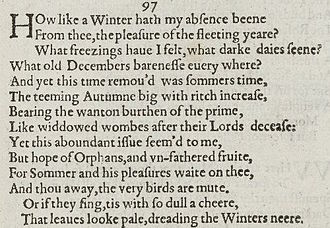Poem by William Shakespeare
| Sonnet 97 |
|---|
 Sonnet 97 in the 1609 Quarto |
 |
|
|
How like a winter hath my absence been
From thee, the pleasure of the fleeting year!
What freezings have I felt, what dark days seen!
What old December’s bareness every where!
And yet this time remov’d was summer’s time;
The teeming autumn, big with rich increase,
Bearing the wanton burthen of the prime,
Like widowed wombs after their lords’ decease:
Yet this abundant issue seem’d to me
But hope of orphans and unfather’d fruit;
For summer and his pleasures wait on thee,
And, thou away, the very birds are mute;
Or, if they sing, ’tis with so dull a cheer
That leaves look pale, dreading the winter’s near.
|
|
|
|
—William Shakespeare[1]
|
| |
Sonnet 97 is one of 154 sonnets written by the English playwright and poet William Shakespeare. It is a member of the Fair Youth sequence, in which the poet expresses his love towards a young man. It is the first of three sonnets describing a separation between the speaker and the beloved.
